- Головна
- Готові шкільні презентації
- Презентація на тему «British traditions» (варіант 1)
Презентація на тему «British traditions» (варіант 1)
340
Слайд #1
British traditions
By
By
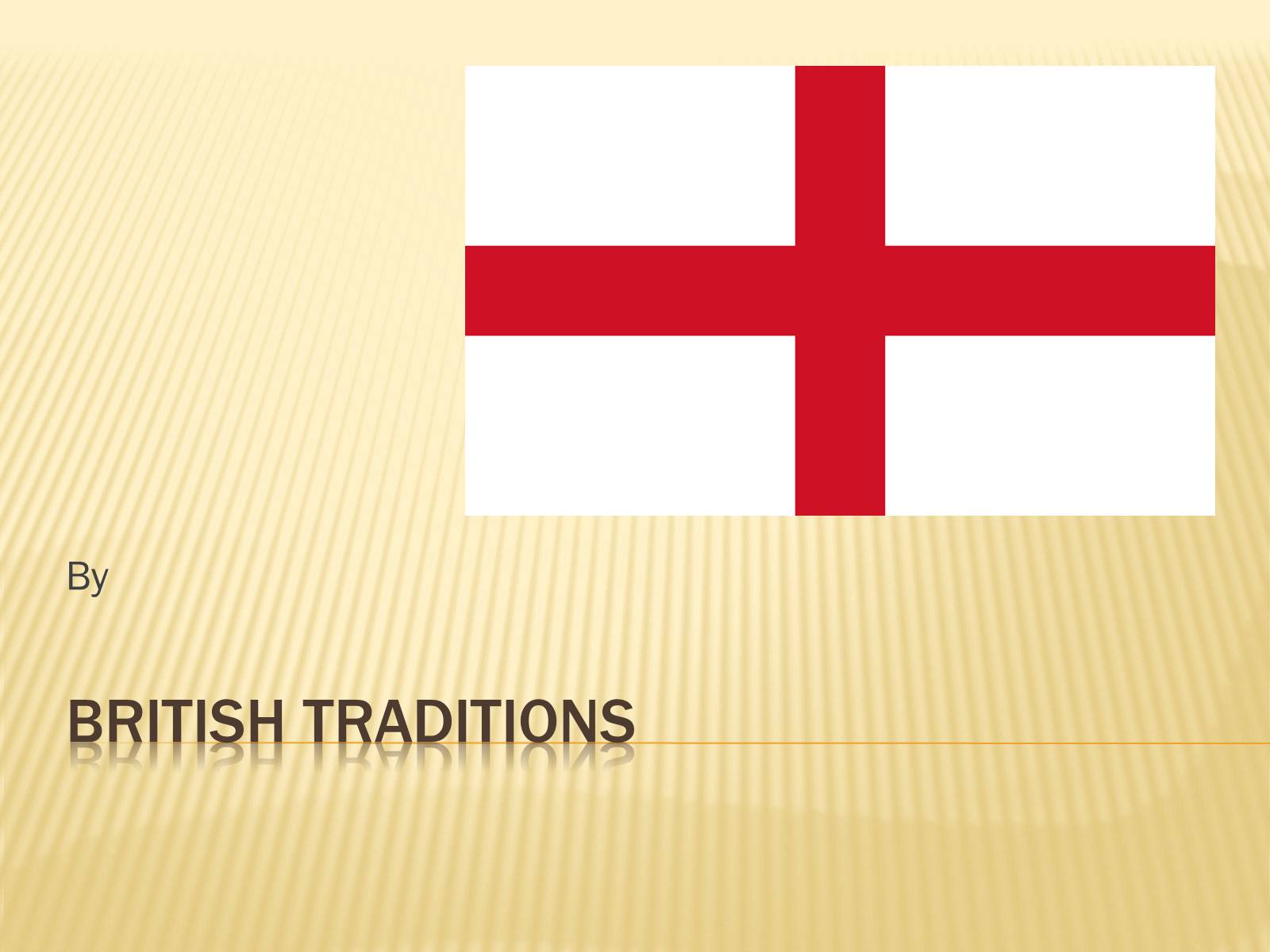
Слайд #2
Changes in diet over the Years
Britain is an island between the North Sea and the Atlantic Ocean. For people living near the sea, fish and shellfish have always been popular food.
Away from the sea, people first ate wild animals, but then hundreds of years ago they began keeping sheep, cows and chickens on farms. Farmers have grown fruit, vegetables and cereals (for bread making) for centuries too.
During the Middle Ages (11th to 15th Century), Ships brought sugar, nuts and spices from far away. The spices were often used to hide the taste of the food which was going bad! When sailors went to foreign places they bought back more kinds of food.
When fridges and freezes were invented, people could keep food much longer.
Britain is an island between the North Sea and the Atlantic Ocean. For people living near the sea, fish and shellfish have always been popular food.
Away from the sea, people first ate wild animals, but then hundreds of years ago they began keeping sheep, cows and chickens on farms. Farmers have grown fruit, vegetables and cereals (for bread making) for centuries too.
During the Middle Ages (11th to 15th Century), Ships brought sugar, nuts and spices from far away. The spices were often used to hide the taste of the food which was going bad! When sailors went to foreign places they bought back more kinds of food.
When fridges and freezes were invented, people could keep food much longer.
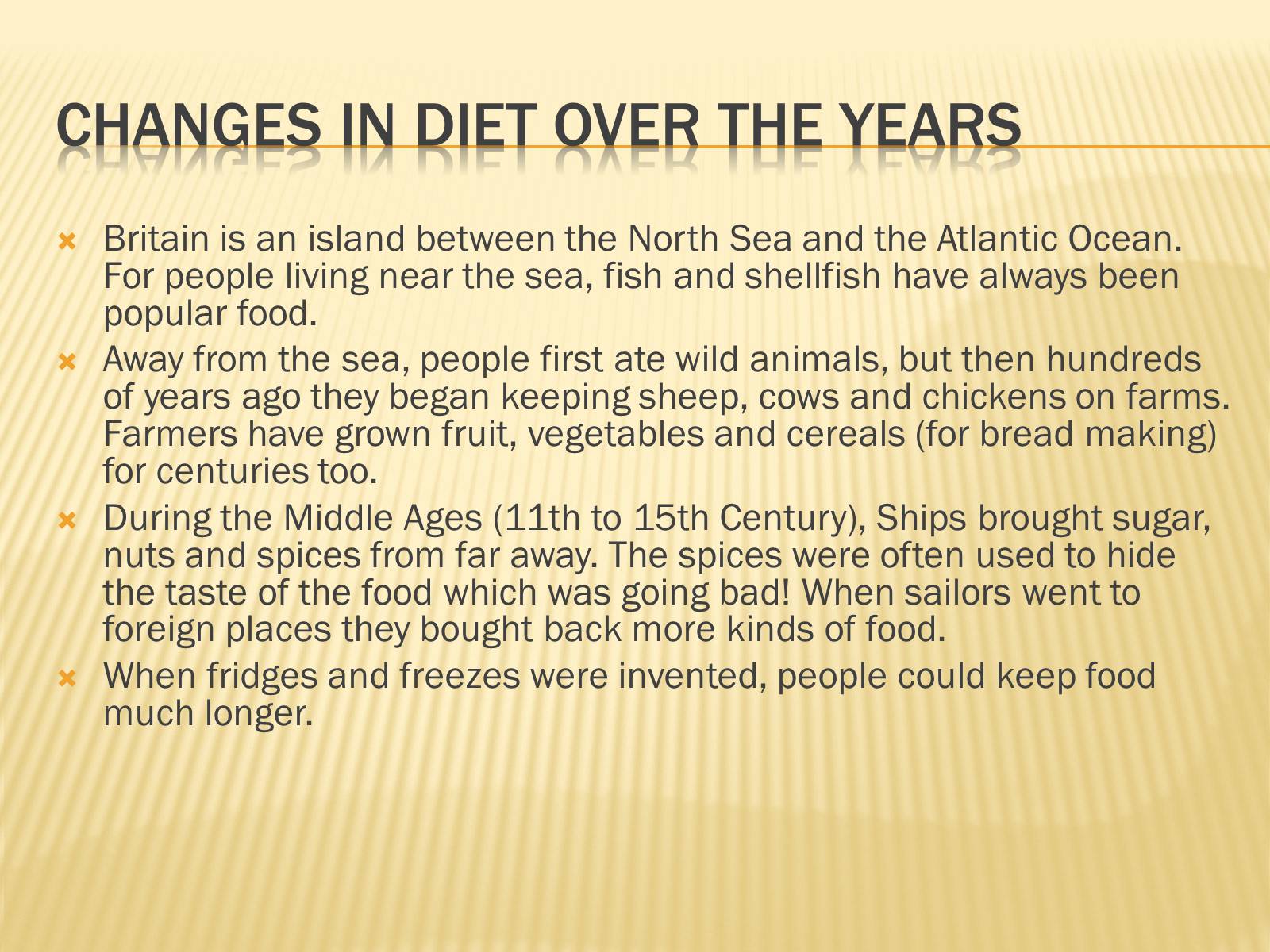
Слайд #3
What food was "invented" or discovered in England?
1762: The sandwich was invented in England.
There is a town named Sandwich in the south of England. John Montagu, the Earl of Sandwich invented a small meal that could be eaten with one hand while he continued his nonstop gambling.
1762: The sandwich was invented in England.
There is a town named Sandwich in the south of England. John Montagu, the Earl of Sandwich invented a small meal that could be eaten with one hand while he continued his nonstop gambling.
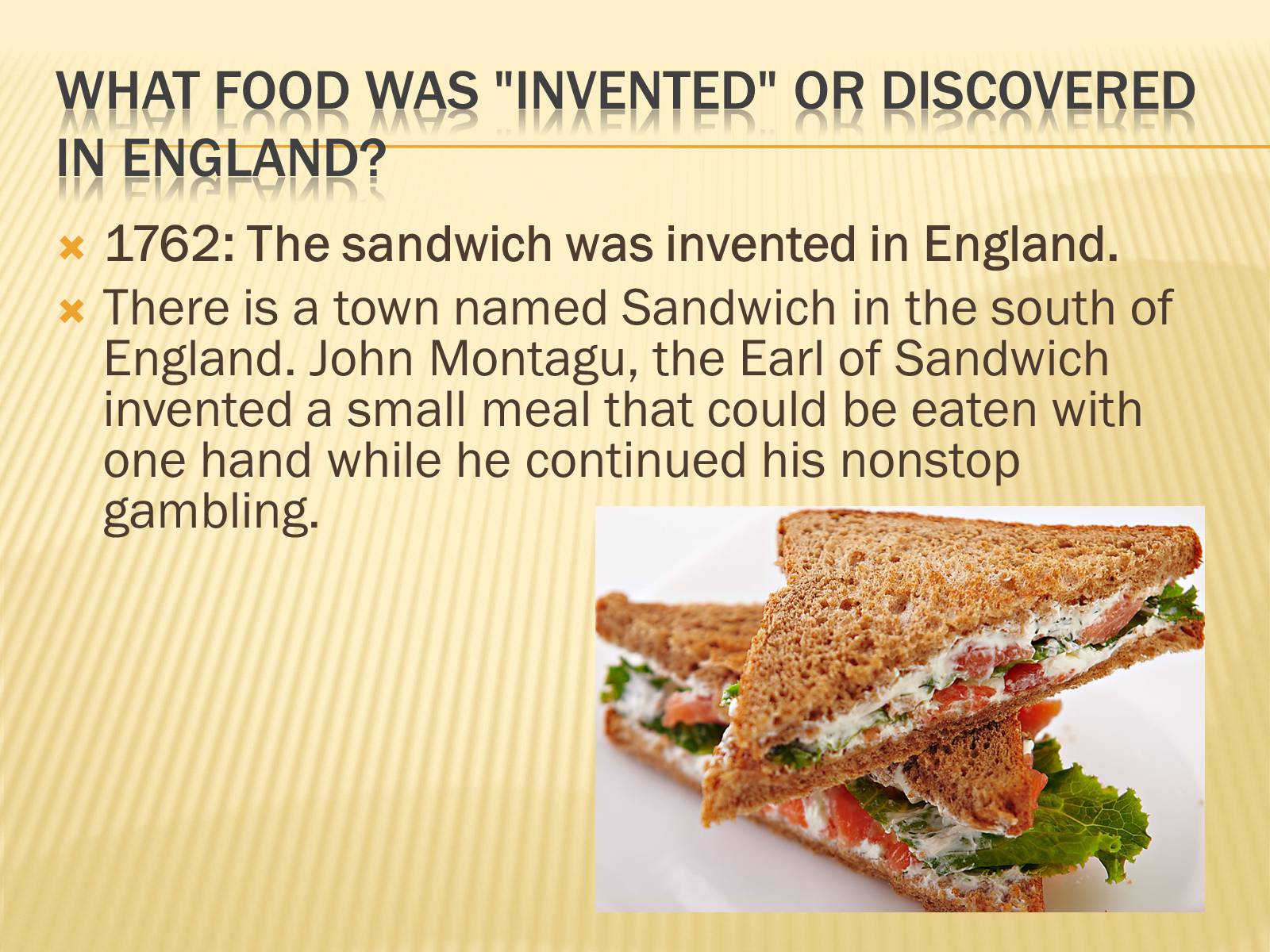
Слайд #4
Marmite
1902: Marmite was invented in England.
Marmite is dark brown-coloured savoury spread made from the yeast that is a by-product of the brewing industry. It has a very strong, slightly salty flavour. It is definitely a love-it-or-hate-it type of food.
1902: Marmite was invented in England.
Marmite is dark brown-coloured savoury spread made from the yeast that is a by-product of the brewing industry. It has a very strong, slightly salty flavour. It is definitely a love-it-or-hate-it type of food.
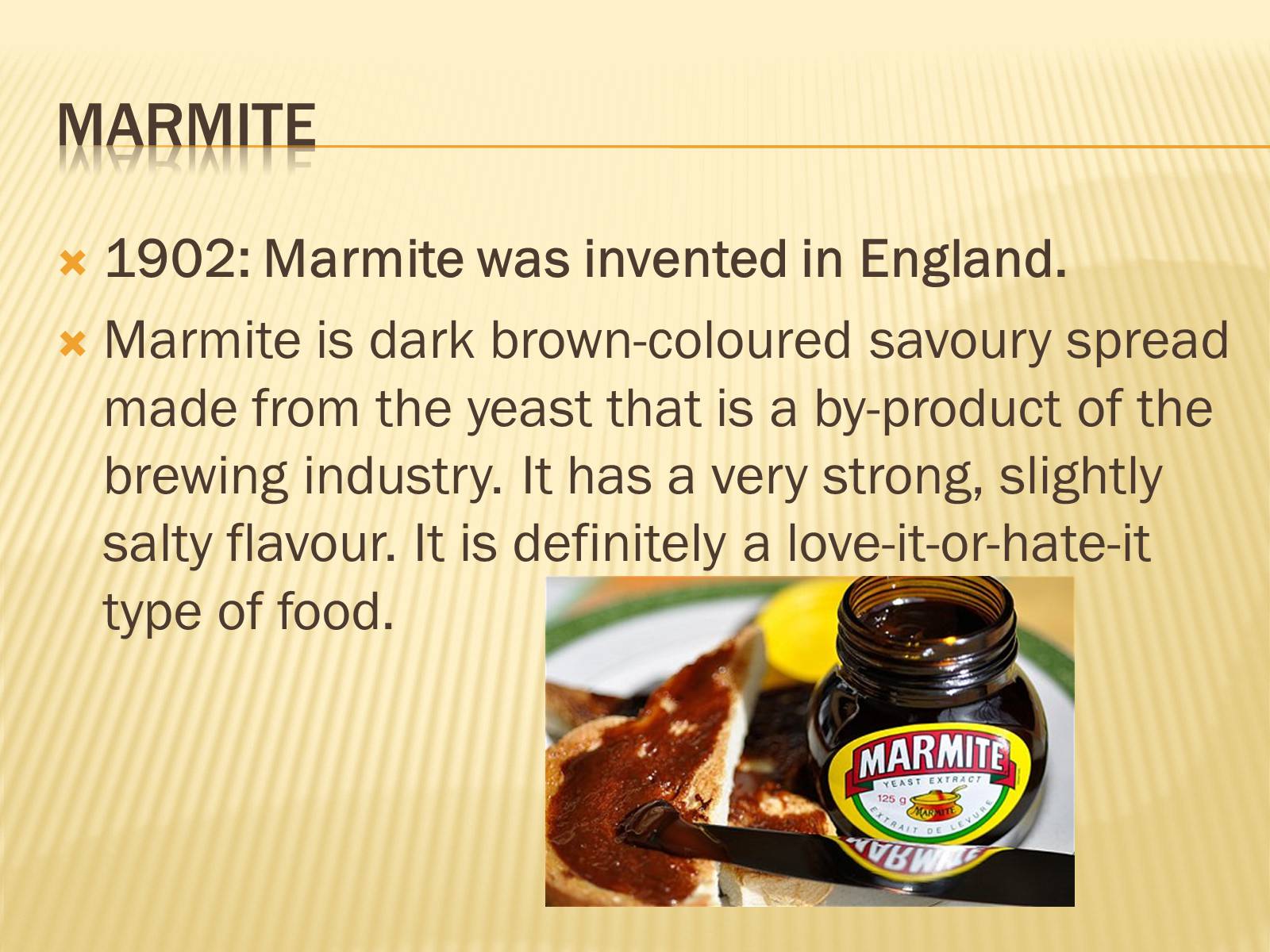
Слайд #5
hP Sauce
HP Sauce was invented in England at the end of the 19th century by Mr Garton, a Nottingham grocer. He was down on his luck and couldn't pay his bills, so when Edwin Samson Moore, owner of the Midland Vinegar Company, offered to cancel his debt with the company and pay him £150 for the recipe, plus the use of the name HP, Garton jumped at the chance.
Moore had been looking around for some time for a sauce to manufacture and market. He liked both the taste and the name of Garton's HP Sauce, which had an appropriately patriotic ring to it. The HP stood for Houses of Parliament, as it was rumoured that the sauce had been seen gracing the tables of one of the dining rooms there.
HP Sauce was invented in England at the end of the 19th century by Mr Garton, a Nottingham grocer. He was down on his luck and couldn't pay his bills, so when Edwin Samson Moore, owner of the Midland Vinegar Company, offered to cancel his debt with the company and pay him £150 for the recipe, plus the use of the name HP, Garton jumped at the chance.
Moore had been looking around for some time for a sauce to manufacture and market. He liked both the taste and the name of Garton's HP Sauce, which had an appropriately patriotic ring to it. The HP stood for Houses of Parliament, as it was rumoured that the sauce had been seen gracing the tables of one of the dining rooms there.
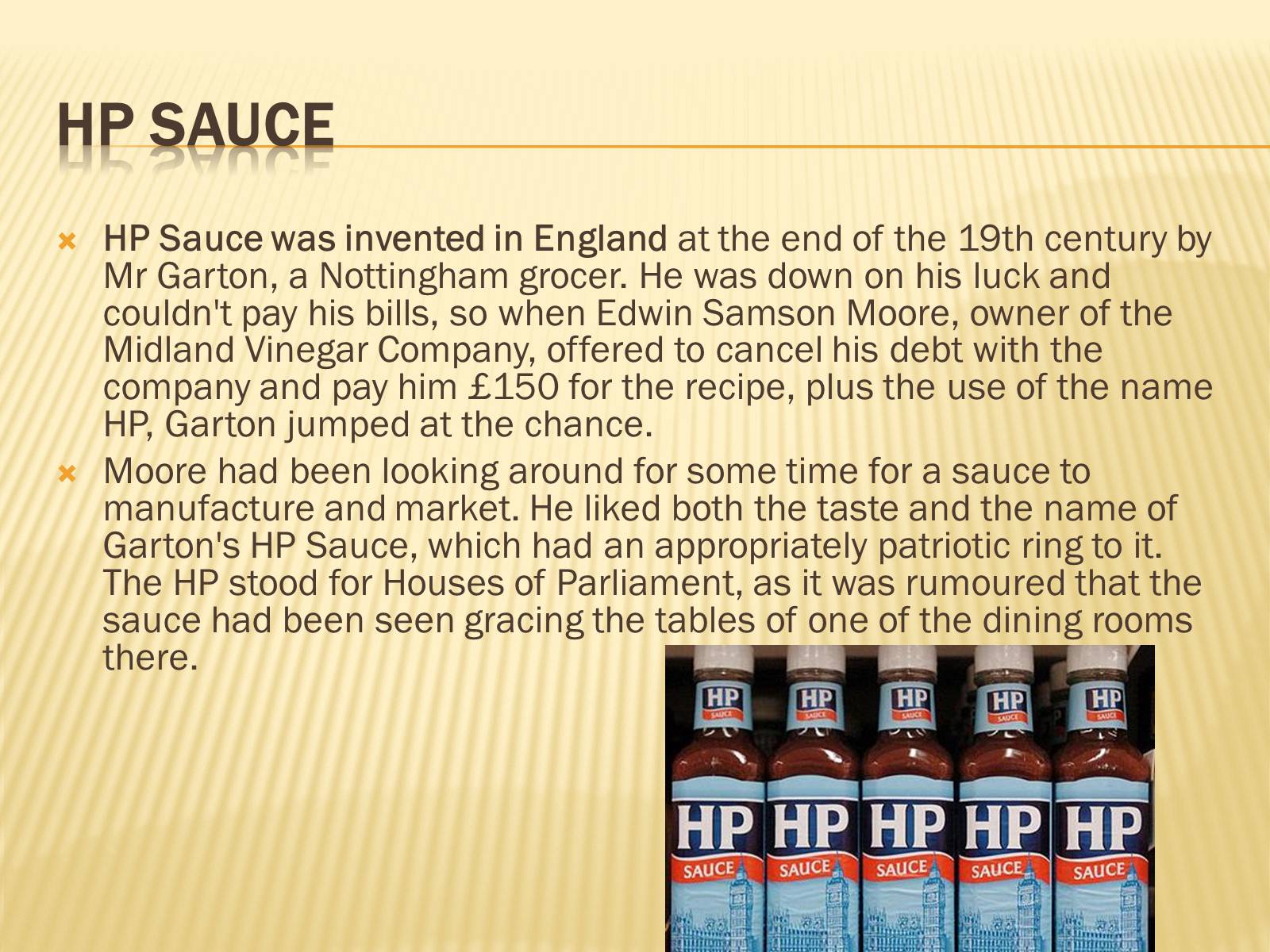
Слайд #6
Worcestershire Sauce (Worcester Sauce)
1837 John Lea and William Perrins of Worcester, England started manufacturing Worcester Sauce (Worcestershire).
Worcester sauce was originally an Indian recipe, brought back to Britain by Lord Marcus Sandys, ex-Governor of Bengal. He asked two chemists, John Lea and William Perrins, to make up a batch of sauce from his recipe.
1837 John Lea and William Perrins of Worcester, England started manufacturing Worcester Sauce (Worcestershire).
Worcester sauce was originally an Indian recipe, brought back to Britain by Lord Marcus Sandys, ex-Governor of Bengal. He asked two chemists, John Lea and William Perrins, to make up a batch of sauce from his recipe.
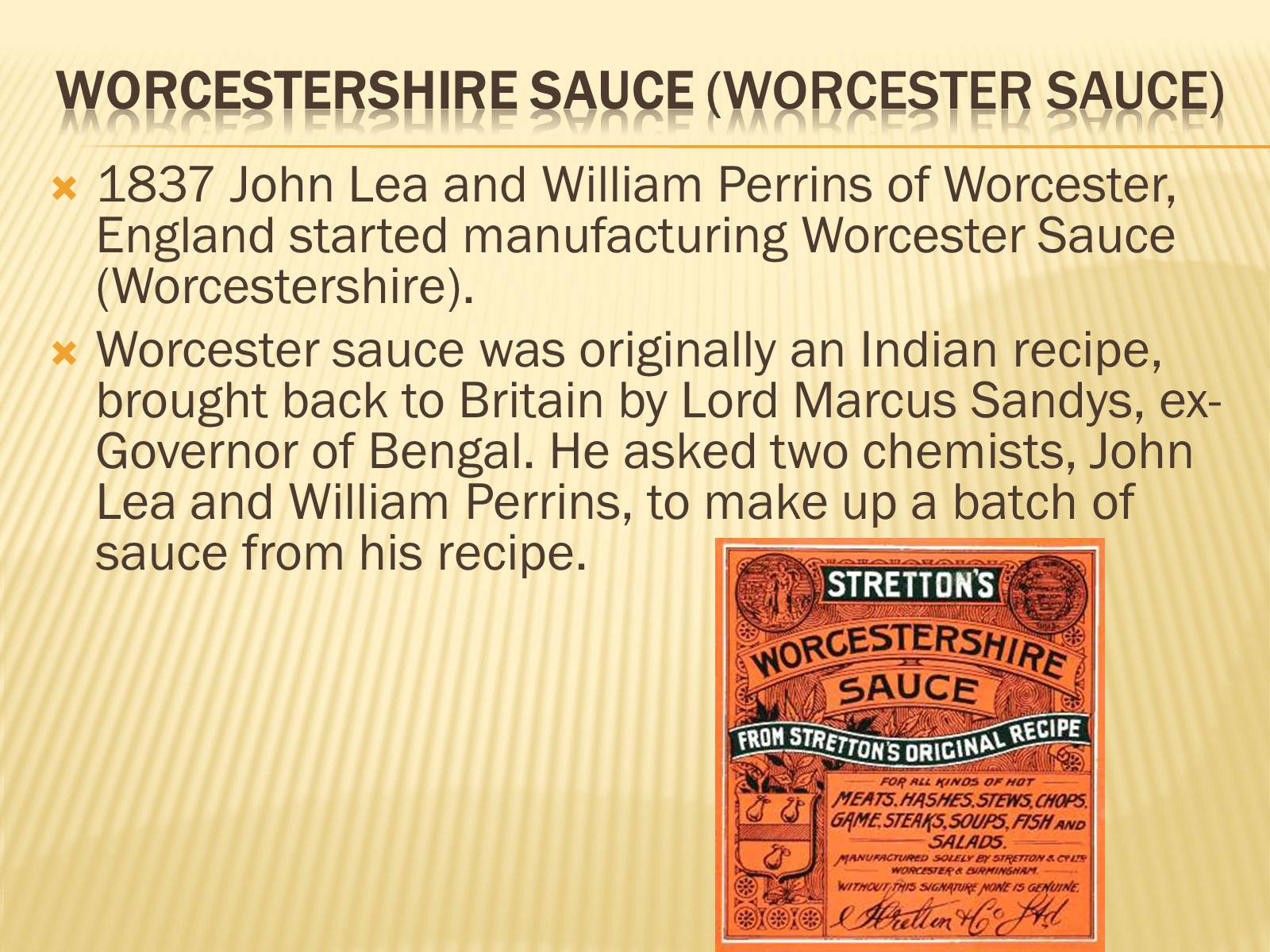
Слайд #7
AFTERNOON TEA (The traditional 4 o'clock tea)
This is a small meal, not a drink. Traditionally it consists of tea (or coffee) served with either of the following:
Freshly baked scones served with cream and jam (Known as a cream tea)
Afternoon tea sandwiches - thinly sliced cucumber sandwiches with the crusts cut off.
Assorted pastries
Afternoon tea became popular about one hundred and fifty years ago, when rich ladies invited their friends to their houses for an afternoon cup of tea. They started offering their visitors sandwiches and cakes too. Soon everyone was enjoying Afternoon tea
This is a small meal, not a drink. Traditionally it consists of tea (or coffee) served with either of the following:
Freshly baked scones served with cream and jam (Known as a cream tea)
Afternoon tea sandwiches - thinly sliced cucumber sandwiches with the crusts cut off.
Assorted pastries
Afternoon tea became popular about one hundred and fifty years ago, when rich ladies invited their friends to their houses for an afternoon cup of tea. They started offering their visitors sandwiches and cakes too. Soon everyone was enjoying Afternoon tea
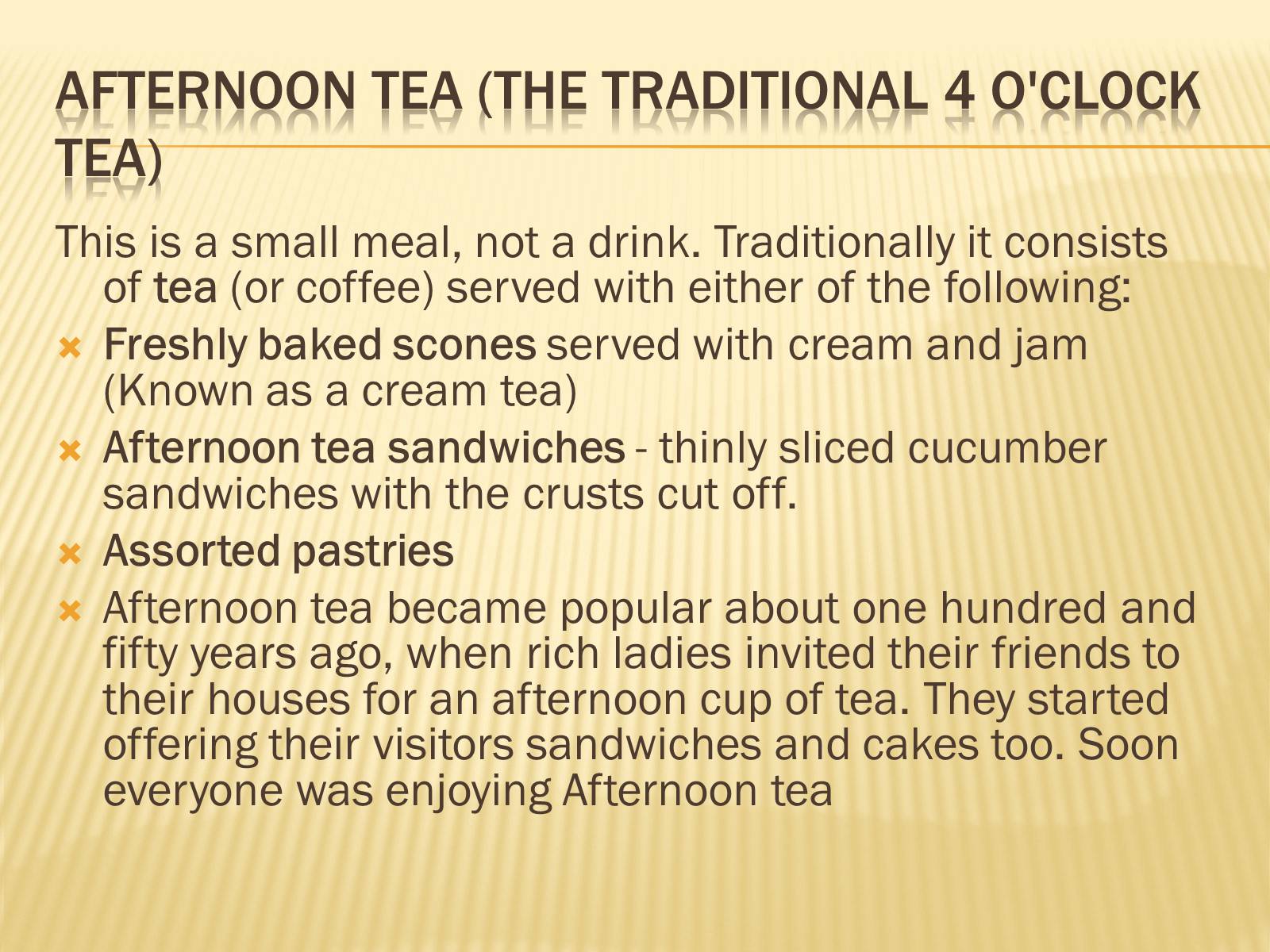
Слайд #8
HIGH TEA (The traditional 6 o'clock tea)
The British working population did not have Afternoon Tea. They had a meal about midday, and a meal after work, between five and seven o'clock. This meal was called 'high tea' or just 'tea'.
Traditionally eaten early evening, High tea was a substantial meal that combined delicious sweet foods, such as scones, cakes, buns or tea breads, with tempting savouries, such as cheese on toast, toasted crumpets, cold meats and pickles or poached eggs on toast. This meal is now often replaced with a supper due to people eating their main meal in the evenings rather than at midday.
The British working population did not have Afternoon Tea. They had a meal about midday, and a meal after work, between five and seven o'clock. This meal was called 'high tea' or just 'tea'.
Traditionally eaten early evening, High tea was a substantial meal that combined delicious sweet foods, such as scones, cakes, buns or tea breads, with tempting savouries, such as cheese on toast, toasted crumpets, cold meats and pickles or poached eggs on toast. This meal is now often replaced with a supper due to people eating their main meal in the evenings rather than at midday.
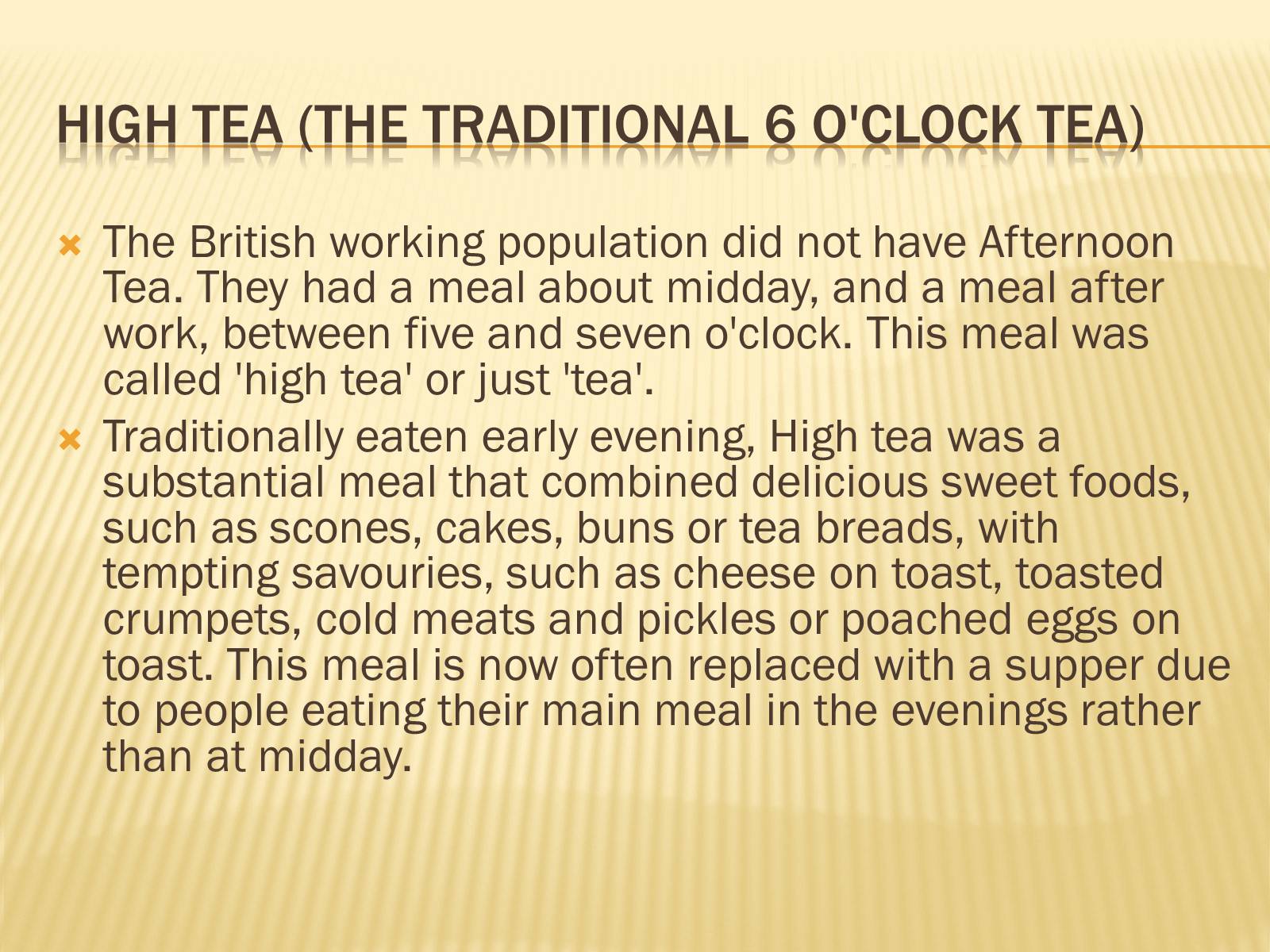
Слайд #9
tea
The traditional way of making tea is:
Boil some fresh cold water. (We use an electric kettle to boil water)
Put some hot water into the teapot to make it warm.
Pour the water away
Put one teaspoon of tea-leaves per person, and one extra tea-spoon, into the pot.
Pour boiling water onto the tea.
Leave for a few minutes.
Serve
The traditional way of making tea is:
Boil some fresh cold water. (We use an electric kettle to boil water)
Put some hot water into the teapot to make it warm.
Pour the water away
Put one teaspoon of tea-leaves per person, and one extra tea-spoon, into the pot.
Pour boiling water onto the tea.
Leave for a few minutes.
Serve
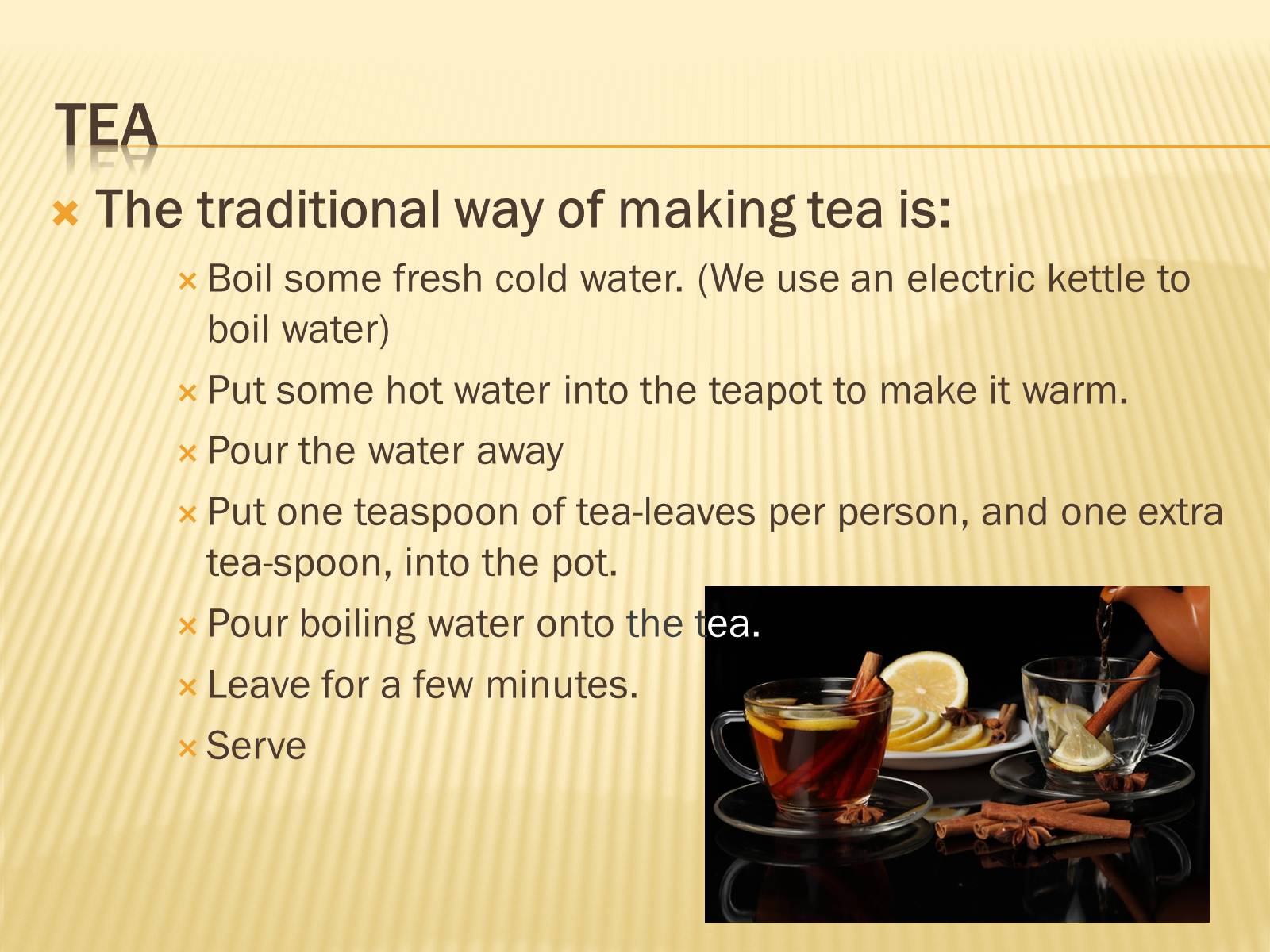
Слайд #10
The end!
